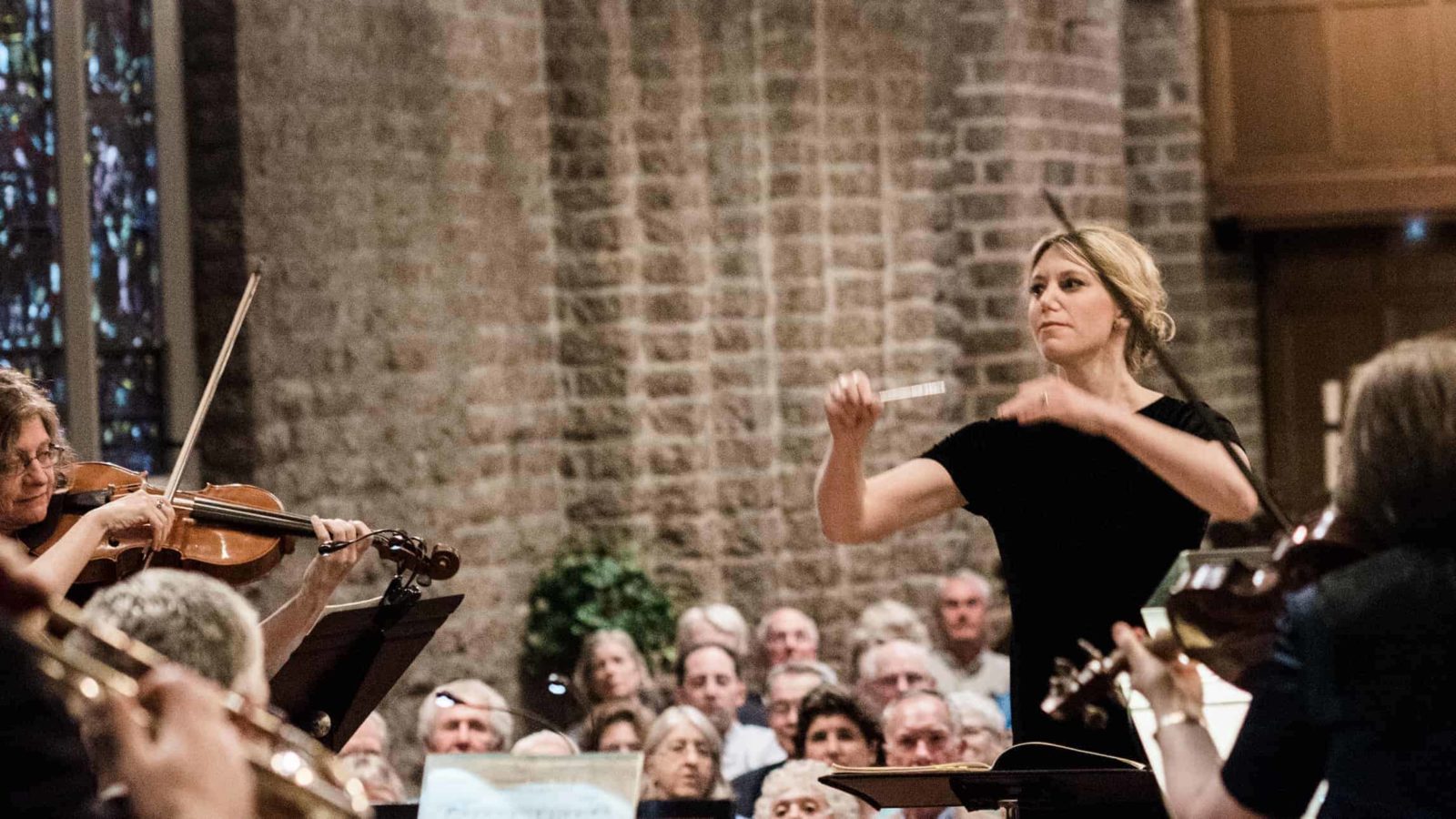Emily Isaacson remembers attending classical concerts as a teenager, feeling the music viscerally, connecting with the sound. The music was exciting, passionate — it made her want to move her body. It let her tap into feelings she could not put into words.
At the same time, she felt a disconnect between the way the music moved her and the way traditional concerts wanted Isaacson to listen to it — in silence, in a cathedral-like hall, following unwritten rules. She wants to “clap between movements and sway in the aisles,” she says. And so she has made it her work to bring music to the community as a shared experience and a call to action.
At Williams College and around the world, she has seen many kinds music acting as a catalyst, she says, and drawing community together. She wants to see classical music doing that work and holding that energy. So she has started her own center for it, even in the pandemic.
Today, she serves as founder and artistic director of Classical Uprising in Portland, Maine. She created the nonprofit at the height of Covid in 2020, merging Boston’s Oratorio Chorale, which she has led since 2013, with the Portland Bach Experience, which she founded in 2018.
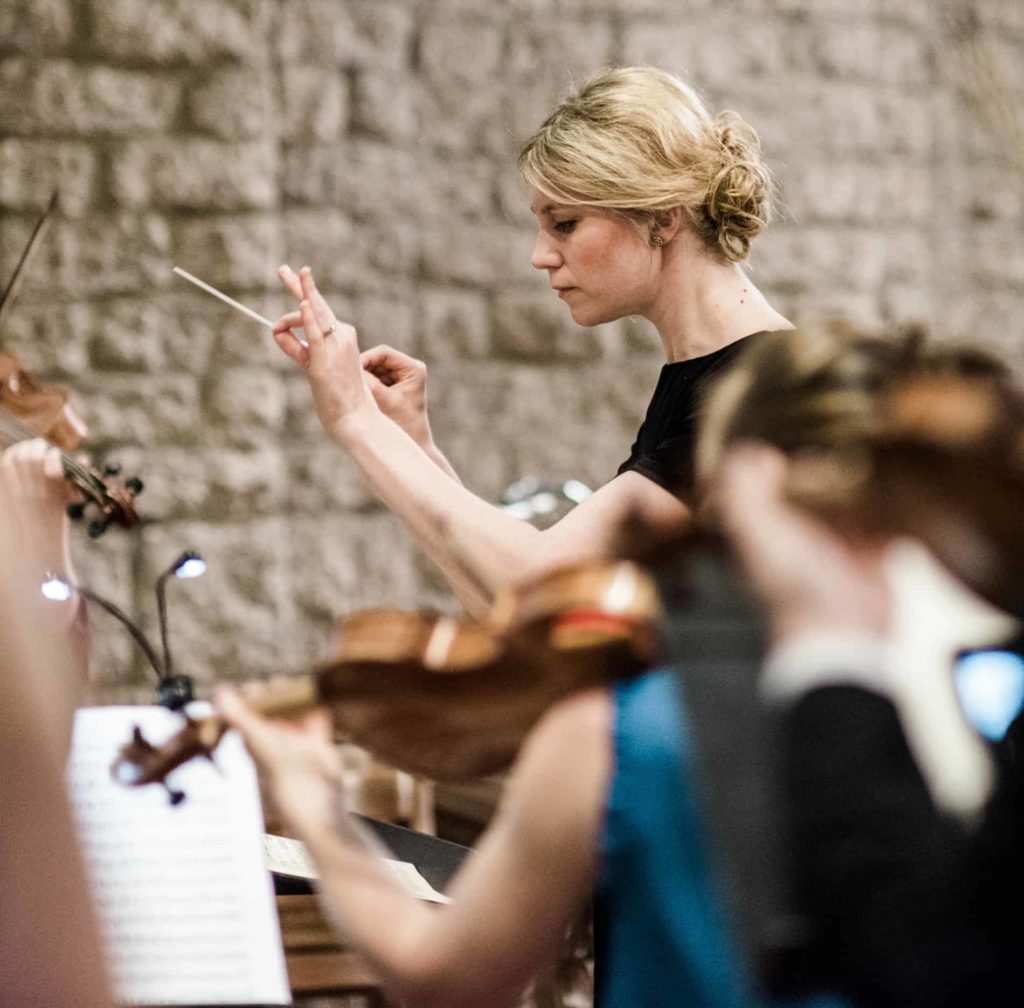
Emily Isaacson leads musicians in Classical Uprising. Press photo courtesy of the artist
She now leads more than 120 adult amateur singers, 70 young musicians and 60 professional artists in performances that move music out of the concert hall and into the places where people are — the ferry station, the farmers’ market, the grocery store, the library — through sound installations, events and programs.
This summer, Classical Uprising held the Portland Bach Experience, a live, mostly in-person series across 10 days in June, including A Midsummer Night’s Dream: Carnival Concert & Community Celebration — a day-long music festival including a parade of giant puppets, a Fairy Queen drag show with a live symphony orchestra and a community dance party. The musicians performed around town throughout the festival, from a Bach and Beer night pairing concerts and brews to Handel happy hours and family ice cream concerts.
Isaacson traces her passion for this work to Williams. Though she majored in English, she had wanted to work in music as a conductor since she was 13, and she explored growing interests in political activism.
She created a sound composition and installation in a course on music in politics taught by political science professor Mark Reinhardt and artist and lecturer Peggy Diggs, and she found a mentor in Williams choral director Brad Wells.
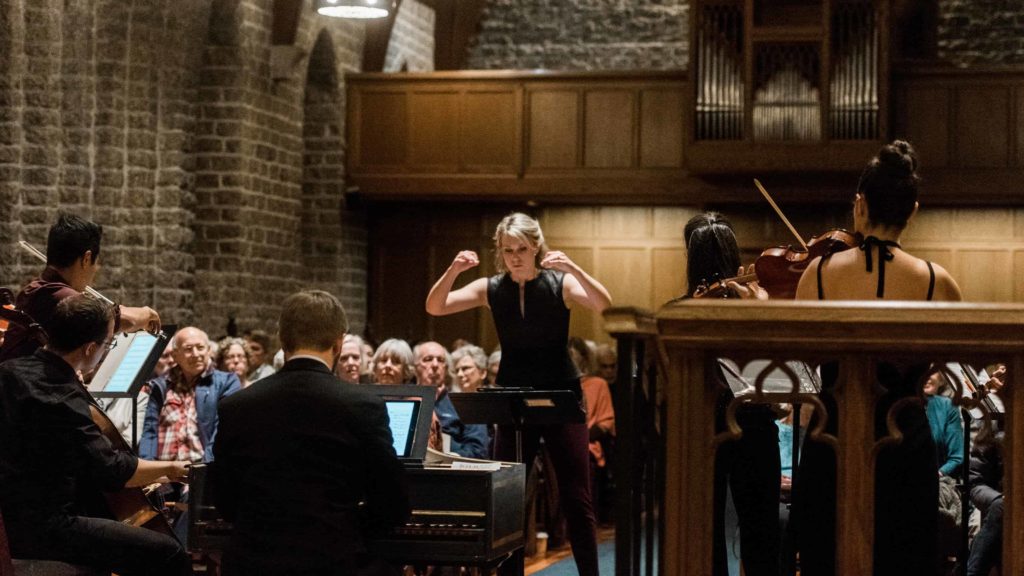
Musicians in the Portland Bach Experience perform on the Maine Coast. Press photo courtesy of the artist
“I walked into Williams ready to have conversations with Brad about how do I build this career, what are the next steps, what do I need to study,” Isaacson says. “And so Brad and I must have had dozens, if not a hundred, brown bag lunches under the trees — I can picture it outside WCMA—talking about this stuff: what is an ensemble, what is classical music, what is the way to experience classical music.”
She followed that path in the years after she graduated, with a master’s degree in musicology at University of Edinburgh, a master’s in music and choral conducting at University of Oregon and doctorate in musical arts and conducting from University of Illinois. She traveled and studied in Sweden and in Cuba. And then she began working with Wells in 2008 to found the Grammy Award-winning ensemble Roomful of Teeth.
She worked as his assistant, approaching funders and writing grant applications, and she saw the grit and consistency Wells needed to bring to life an ensemble that brings together musical traditions from around the world. The group has a sense of invention and connection, she says, in the same spirit that moves her work today.
‘I want to clap between movements and sway in the aisles.’ — Emily Isaacson
“Roomful of Teeth has become, I would say, the most influential ensemble in choral music and even in classical music in the last decade,” Isaacson says. “Brad and the Teeth have broken down enormous barriers.”
“It’s all about flexibility, connecting, reconfiguring, re-imagining, opening, a real touch sense … Inclusivity — I think all of that — an expansive sense of what is expression — all of that I think is in Brad’s work and mine.”
Wells continues to be a mentor, and she still collaborates with Roomful of Teeth’s musicians and composers: Dashon Burton, Esteli Gomez, Pulitzer Prize-winner Caroline Shaw and more.
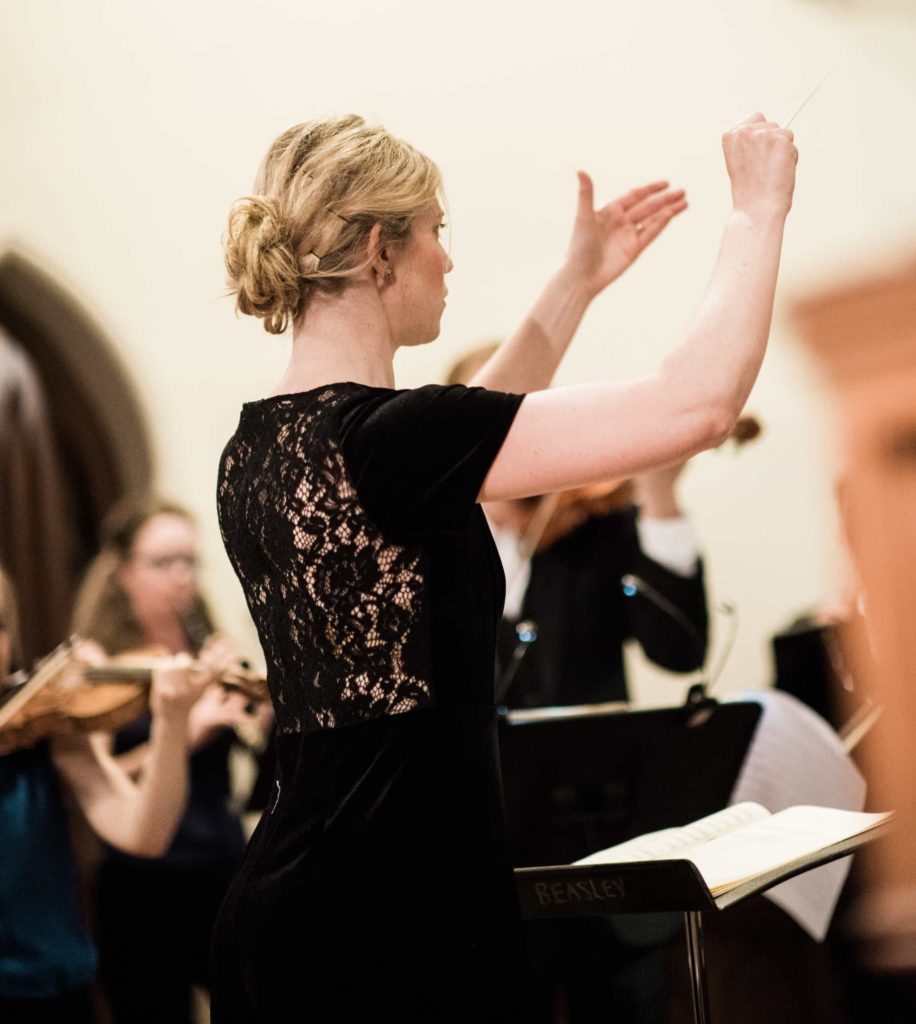
Emily Isaacson conducts Classical Uprising in the Portland Bach Experience. Press photo courtesy of the artist
Classical Uprising, too, seeks to remove barriers, presenting classical music the way composers envisioned it and musicians originally played it. Centuries ago, Isaacson says, people heard Bach in crowded, informal rooms, Isaacson says, with friends around them talking, flirting and drinking.
“Bach’s secular music premiered at Zimmerman’s Coffee House,” she says. “It was a coffee shop—and coffee was a borderline illicit drug in Leipzig at the time. … It was one of the only places middle-class men and women could mingle without supervision. … This is their release on a Saturday night.”
People want to listen to classical music that way today, too, she says.
“In our free time, we want to talk, we want to connect, we want to spend time with our kids, our family,” she says. “I want to put this music back into its natural habitat. … We’ll bring art to where your life is.”
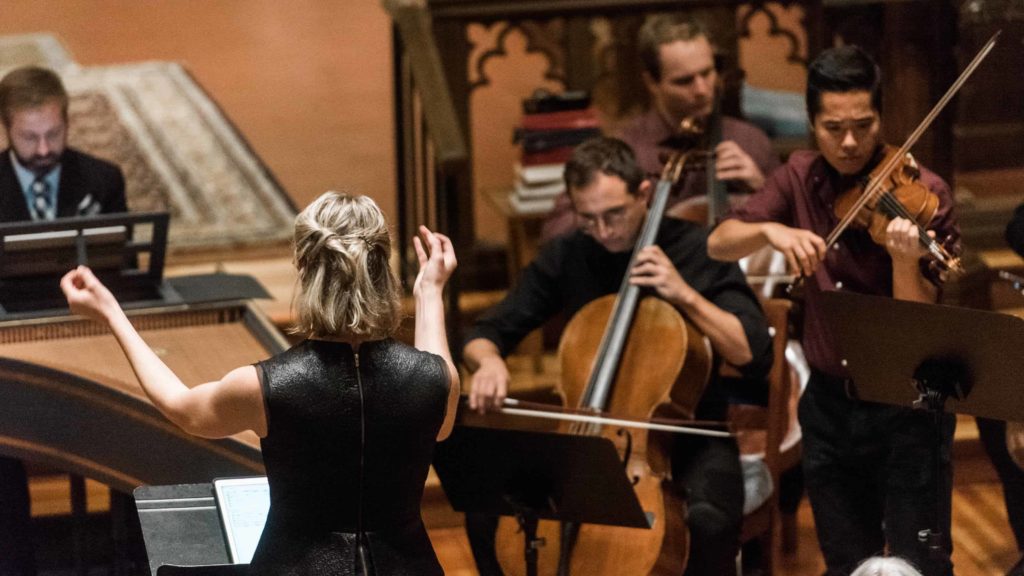
Founder and artistic director of Classical Uprising in Portland, Maine., Emily Isaacson leads musicians in the Portland Bach Experience. Press photo courtesy of the artist
This summer’s A Midsummer Night’s Dream is Classical Uprising’s fourth program this year. This past winter, Grammy-nominated and internationally acclaimed countertenor Reginald Mobley worked with Isaacson to create Amazing Grace, a virtual concert of Black spirituals from the 1600s to the Black Lives Matter movement.
Mobley and virtual reality artist Janay Woodruff of JanaeSound performed as soloists with the Oratorio Chorale, and readings wove through the music — Judith Casselberry, Associate Professor of Africana Studies at Bowdoin College, offered research and reflections from leaders across the years, from Frederick Douglass and W.E.B. DuBois.
Through Williams’ wINTERNship program in January, Gwyn Chilcoat ’24 researched contemporary writers, as the concert moves into the experiences of people today with works like Porsha Olayiwola’s poem “How to make yourself small or how to be black and survive” — and Bernice Johnson Reagon, founder of the acclaimed a cappella ensemble Sweet Honey in the Rock, honors the depth in the music: “Spirituals record the struggle of a people to survive … They have the power to touch the souls and stir the emotions of people who sing and hear them.”
‘I want to put this music back into its natural habitat. … We’ll bring art to where your life is.’ — Emily Isaacson
And as a pandemic winter turned to spring, Paige Busse ’24 helped Isaacson set up Thanks in Variations, Portland’s first integrated sound garden, which took place at Thompson’s Point South Garden in April. The outdoor, interactive installation drew on mindfulness meditation and Isaacson’s new arrangement of a 15th-century canon, Johannes Ockeghem’s Deo Gratias.
Hers is a contemporary work, she says, inspired by the equinox and the pandemic. She first led the chorale to perform her music in a concert in March 2020, a week before the pandemic caused a widespread shut-down. People have told her in this dark year, her music has given them light.
“The voices of community are here,” Isaacson says, “and we are still supporting one another.”
I wrote this story for the Williams College Alumni Magazine, and it first ran on the magazine’s website in summer 2021. I am running it here with thanks, in honor of Emily Isaacson’s ongoing work and her holiday concerts.

